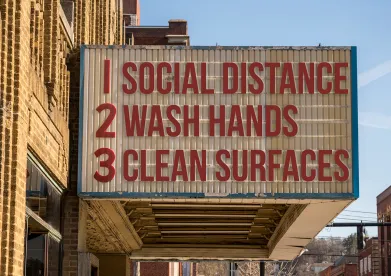OVERVIEW OF CERTAIN RESTRICTIONS:
| Already In Place by March 20, 2020 |
In-person workforce reduction by 50%, except for essential businesses.
All common portions of retail shopping malls with an excess of 100,000 square feet of retail space available for lease must close, unless they have a separate exclusive entrance. Essential businesses exempt. Closure of indoor and outdoor public amusement, video lottery or casino gaming, gyms, fitness centers or classes, and movie theaters. |
| By March 21, 2020 at 8 p.m. |
In person workforce reduction by 75%, except for essential businesses.
All barbershops, hair salons, tattoo or piercing salons, nail salons, hair removal services and related personal care services must close. |
| By March 22, 2020 at 8 p.m. | 100% of the New York workforce must stay home, except for essential businesses. |
STATEWIDE RESTRICTIONS:
On Saturday, March 21, 2020 Governor Cuomo signed Executive Order 202.9. The Order mandates that banks not granting a 90-day forbearance to persons or businesses who have a financial hardship as a result of the COVID-19 pandemic, is an unsafe and unsound business practice. This applies to banks under the jurisdiction of the Department of Financial Services. The Order also mandates that the Department’s Superintendent will issue regulations to require that the application for such forbearance be made widely available for consumers, and that fees for the use of automated teller machines (ATMs), overdraft fees and credit card late fees, may be restricted or modified during this period of emergency.
On Friday, March 20, 2020, Governor Cuomo signed Executive Order 202.8. The Order mandates that except for essential businesses, “each employer shall reduce the in-person workforce at any work locations by 100% no later than March 22 at 8 p.m.,” superseding the Governor’s prior reduction by 75%. Guidance on what constitutes an essential business is here. Additionally, businesses seeking designation as an essential business in New York can begin the process here. The Order also limits court operations to essential matters only, and tolls the time limit for beginning, filing, or the service of any legal action or process until the date the Order expires, April 19, 2020.
On the same date, the Governor also announced the New York State on PAUSE Executive Order, which he described as a 10-point plan. The plan includes social distancing requirements, limitations on the use of public transportation, the requirement that essential businesses implement social distancing, and the cancelation of non-essential gatherings of any size for any reason. Press on the 10-point plan is here. The Governor also announced “Matilda’s Law,” which lists rules for New Yorkers age 70 and older, or with compromised immune systems, or underlying illnesses. The rules include the mutual wearing of masks when in the company of others, limiting visits to immediate family members or close friends in times of emergency assistance, and prescreening measures for any visitors—including taking visitor temperature and checking visitors for flu-like symptoms.
On March 19, 2020, Governor Cuomo issued Executive Order 202.7, which mandates the closure of all barbershops, hair salons, tattoo or piercing salons, nail salons, hair removal services and related personal care services effective Saturday, March 21 at 8:00 p.m. This includes nail technicians, cosmetologists and estheticians, and the provision of electrolysis, and laser hair removal services. Order 202.7 also provides for alternative notarization procedures. The Order remains in effect through April 18, 2020.
Executive Order 202.6, issued by Governor Cuomo on March 18, 2020, defines essential businesses and services as “essential health care operations including research and laboratory services; essential infrastructure including utilities, telecommunication, airports and transportation infrastructure; essential manufacturing, including food processing and pharmaceuticals; essential retail including grocery stores and pharmacies; essential services including trash collection, mail, and shipping services; news media; banks and related financial institutions; providers of basic necessities to economically disadvantaged populations; construction; vendors of essential services necessary to maintain the safety, sanitation and essential operations of residences or other essential businesses; vendors that provide essential services or products, including logistics and technology support, child care and services needed to ensure the continuing operation of government agencies and provide for the health, safety and welfare of the public.” Additionally, the Order directed individuals to the Empire State Development Corporation for additional guidance on what constitutes essential businesses. Businesses deemed essential by the issued guidance, who are not explicitly listed above, include, among others, restaurants/bars, hardware and building material stores, agriculture, laundromats, storage for essential businesses, and places of accommodation. Any business not covered by the guidance may request an opinion as to whether they are essential from the Empire State Development Corporation at this link.
Executive Order 202.5, also issued March 18, 2020, mandated all common portions of retail shopping malls with an excess of 100,000 square feet of retail space available for lease to close and cease access to the public effective March 19, 2020 at 8 p.m. The Order also closed to the public all places of indoor and outdoor public amusement, including, among others, amusement parks, aquariums, bowling alleys, and family attractions through April 17, 2020. Public parks and open recreation areas are exempt. Additionally, when Order 202.5 was originally issued, any mall stores with their own external entrance open to the public, separate from a general mall entrance, were allowed to remain open. That remains in effect today, subject to the restriction that 100% of the workforce work from home, unless it is an essential business. If it is, then it must implement rules that help facilitate social distancing of at least six feet.
Executive Order 202.4, issued March 16, 2020, mandated that non-essential local government personnel be able to work from home or take leave without charging accruals effective March 17, 2020. The Order also mandated that all schools close by March 18, 2020, and postponed village elections.
Executive Order 202.3, also issued March 16, 2020, mandated that all restaurants and bars serve food or beverage for off-premises consumption only, either through take-out or delivery. This remains in effect. The Order also mandated the closure of all video lottery or casino gaming, gyms, fitness centers or classes, and movie theaters, effective March 16, 2020 at 8 p.m.
NEWLY ENACTED NEW YORK COVID-19 PAID LEAVE:
Effective March 18, 2020, employees that are subject to mandatory or precautionary orders of quarantine or isolation due to COVID-19 are entitled to sick leave as follows:
-
Employers with 10 or fewer employees (as of Jan. 1, 2020) must provide unpaid sick leave until the termination of any mandatory or precautionary order of quarantine or isolation due to COVID-19. Employers must also guarantee their employees access to Paid Family Leave and disability benefits during the period of quarantine.
-
Employers with 10 or fewer employees (as of Jan. 1, 2020) and a net income greater than $1 million in the previous tax year must provide at least 5 days of paid sick leave, and then unpaid sick leave until the termination of any quarantine or isolation. Employers must also guarantee their employees access to Paid Family Leave and disability benefits for the period of quarantine.
-
Employers with 11 to 99 employees (as of Jan. 1, 2020) and a net income greater than $1 million in the previous tax year must provide at least 5 days of paid sick leave, and then unpaid sick leave until the termination of any quarantine or isolation. Employers must also guarantee their employees access to Paid Family Leave and disability benefits for the period of quarantine.
-
Employers with 100 or more employees (as of Jan. 1, 2020) must provide at least 14 days of paid sick leave during any order of quarantine or isolation.
-
Public employers (which includes, but is not limited to, the state, counties, cities, towns, villages, school districts) must provide at least 14 days of paid sick leave during any order of quarantine or isolation. Each officer or employee will be compensated at his or her regular rate of pay for those regular work hours during which the officer or employee is absent from work due to the mandatory or precautionary order of quarantine or isolation due to COVID-19.
The employee must be able to return to work following the leave and be restored to his or her position held prior to the leave. Any provided sick leave is in addition to an employee’s accrued sick leave provided by the employer’s policy. New York has compiled guidance on the new law, available here. It is currently unclear whether 14 days is calendar or business days; we expect additional guidance will be issued soon.
It should be noted that employees who are deemed asymptomatic or have not yet been diagnosed with a medical condition and are physically able to work remotely or through other means while under the mandatory quarantine or isolation are not eligible to take this leave. Additionally, this law excludes employees subject to quarantine or isolation as a result of non-business travel to a country identified by the Center for Disease Control and Prevention as a Level 2 or 3 risk, if the employee was provided notice of this law and its limitations prior to such travel.
The leave provided under this law will offset the difference of any COVID-19 benefits offered by the federal government, and is available retroactively if an employee is currently under an order of quarantine.
NEW YORK CITY SICK LEAVE:
The New York City Earned Sick and Safe Time Act provides leave to certain employees who perform more than 80 hours of work a year in New York City. Eligible employees accrue 1 hour of leave for every 30 hours worked, and can use up to 40 hours per year. Employer size determines if the leave is paid or unpaid, and existing paid time off policies may satisfy employer responsibilities, provided they meet or exceed the requirements of the law, and specifically state that leave may be used by an employee for any of the purposes under Earned Sick and Safe Time Act without any condition prohibited by the Act. Relevant to COVID-19, permitted uses include, among other things, the diagnosis, care, or treatment of an employee’s, or employee’s family member’s, illness, or the closure of an employee’s place of business or child’s school or place of care due to a public health emergency. Additional information is here.
WESTCHESTER COUNTY SICK LEAVE:
Westchester County’s Earned Sick Leave Law provides leave to certain employees who work in Westchester County for more than 80 hours a year for an employer. Eligible employees accrue 1 hour of sick leave for every 30 hours worked, subject to a 40 hour accrual and use cap. Employer size determines if the leave is paid or unpaid, and existing paid time off policies may satisfy employer responsibilities by frontloading 40 hours of combined paid sick and personal leave and allowing employees to take sick leave without advance notice and without imposing any conditions on use of leave other than as provided in the law. Relevant to COVID-19, permitted uses include the diagnosis, care, or treatment of an employee or employee’s family member’s illness, or the closure of an employee’s business or need to care for a child whose day care or elementary or secondary school has been closed for public health reasons, or care for employee or family member where health authorities determine that the individual’s presence will jeopardize others’ health. Additional information is here.
UNEMPLOYMENT:
If an employer is closed due to COVID-19 or a quarantine order, employees may immediately apply for unemployment benefits in New York, as waiting periods have been waived.
HELPFUL LINKS:
-
Governor Cuomo’s Executive Orders: https://www.governor.ny.gov/executiveorders
-
The Empire State Development Corporation Guidance on Essential Businesses: https://esd.ny.gov/guidance-executive-order-2026
-
Information on New York Paid Sick Leave for COVID-19 Impacted New Yorkers: https://www.governor.ny.gov/programs/paid-sick-leave-covid-19-impacted-new-yorkers
-
Information for Employers on New York City Paid Safe and Sick Leave: https://www1.nyc.gov/site/dca/businesses/paid-sick-leave-law-for-employers.page
-
Information on the Westchester County Earned Sick Leave: https://humanrights.westchestergov.com/resources/earned-sick-leave-law
Co-Authored by Janice Sued Agresti





 />i
/>i
